Highlights
Justice = Jobs: YEP, an Oakland Org, Prepares Youth for Careers, Education Access
While the pandemic put a temporary hold on their progress, the organization found ways to adapt, innovate and continue inspiring the young creative minds they serve. Sixty days after the initial shutdown, YEP was able to bring 60% of participants back on site with proper distancing and ventilation in the warehouse. Students prepared meals for the homeless, continued classes and constructed 10 tiny houses in the back of the facility to help house youth who needed a place to stay. As warehouse training became a highly demanded skill during the pandemic, YEP was able to provide more youth with certifications that led to jobs.
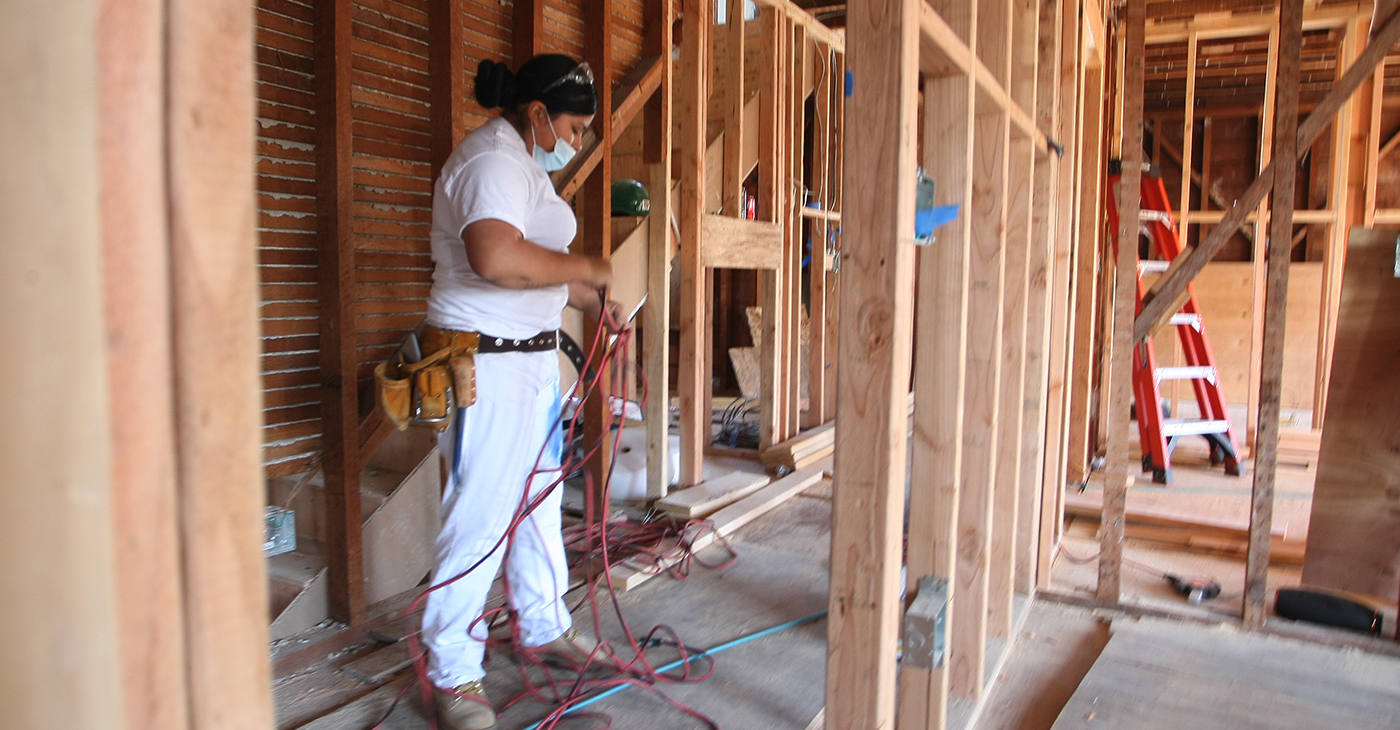
Edward Henderson | Impact Alameda
Oakland’s reputation in American political history is synonymous with raised-fist, steel-spined Black Power activism.
At the geographic heart of Oakland, on International Boulevard, is an organization called the Youth Employment Partnership (YEP). Its mission lines up with that strain of power-to-the-people advocacy the largest city on the East side of the San Francisco Bay is known for. The leaders at YEP say their organization aims to embody the spirit of the city whose youth they serve.
YEP’s headquarters is a warehouse purchased in 2001 with cash that was an allotment from a lawsuit settlement. The suit accused California of spending more on incarcerating youth than the prevention of delinquency.
Today, YEP serves the community as an incubator for job training and education for youth who have are overcoming obstacles in their lives.
“Everything here is built by our young people,” said Michele Clark, Executive Director of YEP.
Clark says she rejects, “that whole concept of having kids and young adults of color being treated like they are not assets to our community.”
“We really feature them as asset builders,” she continued. “Those kinds of things build confidence”
Under YEP’s guidance, the youth working in the warehouse designed and renovated a section of the space every two years for 10 years. Now, their headquarters hosts classes equipping the young people with skills like forklift operation and the culinary arts. It also has a school where high schoolers can earn their diploma and a section in the back with a small community of tiny houses.
“It’s always just a quest of what training can we offer our community that knock out lifelong barriers. High school and other emotional trauma issues, probation, parole, all of those things we get young people to build on and not be depressed by,” said Clark.
YEP was founded in 1973 by a group of teachers from St. Elizabeth High School, along with Dennis Chaconas, who later became Superintendent of Oakland Unified School District. Their goal was to address learning-loss and provide children with engaging and character-building activities over the summer.
The early success the founders had with programs that helped youth succeed at school and jobs led to the organization’s expansion. In 1989, they unaffiliated with St. Elizabeth to continue growing and to extend their work beyond providing summer jobs and offering summer education. In 1991, they officially became The Youth Employment Partnership, Inc.
YEP serves 500 youth and young adults each year. To date, the organization says their alum have earned over $900,000 in wages and incentives; 34,000 trainees have received workforce training and development services; and 80% of trainees benefit from employment or advance education placement.
While the pandemic put a temporary hold on their progress, the organization found ways to adapt, innovate and continue inspiring the young creative minds they serve. Sixty days after the initial shutdown, YEP was able to bring 60% of participants back on site with proper distancing and ventilation in the warehouse. Students prepared meals for the homeless, continued classes and constructed 10 tiny houses in the back of the facility to help house youth who needed a place to stay. As warehouse training became a highly demanded skill during the pandemic, YEP was able to provide more youth with certifications that led to jobs.
“Seeing the tiny homes we’ve built all together and ready for somebody to live in them was my most memorable moment at YEP,” said Christian Gonzales, 17. “It made me feel excited because we put a lot of work and learning into it. The final product felt great to see. I’ve also been hired by the contractor that YEP has hired. It has helped me develop new skills and prepare me for jobs in the future.”
Along with the work training aspect of YEP, education stands as a core pillar to their philosophy of youth development. Tiara Shaw, 18, was recommended to the program by a friend and was inspired by the possibilities that YEP had to offer her.
“With everything that’s been going on with the pandemic and balancing school I started falling off in my senior year,” said Shaw. “I ended up not graduating with everyone else. I wanted to get my GED at least. But then I found out about YEP and that I could get my diploma. It became way more than I thought than just a diploma.”
Joshua Norman, 19, lived down the street from YEP headquarters and was always aware of the work they did. Norman decided to take advantage of YEP’s services when his sister encouraged him to take a leap of faith and try to overcome the challenges in his life with their help.
“The staff are really personable, and I get a lot of help from them. They always have good feedback and actually care about your progress. It’s the people here who make it fun. When I was going through stuff at home and I needed somebody to talk to, I could talk to the staff and have someone understand — besides just being at work,” he said. “If you come here, just know that there are people here to help you and don’t take the chance for granted. Use the opportunity wisely and stay focused on your craft.”
Shaw agrees that youth engaging with YEP and the services they provide have an array of options and resources at their disposal. However, she also believes that the responsibility still lies with them to take advantage of everything.
“YEP is a stepping stone to get where you want to go in life. It’s not there to take you all the way, but it’s there to take you to somewhere, and you make the decisions to go further and do what you want to do,” she says. “There’s not a lot of places that will do this for the youth.”
To learn more about YEP and how to get involved, visit www.yep.org
Education
Dismantling Pipelines to Prison: Fresh Lifelines for Youth (FLY) Reimagines Opportunity for Young People
“Some of the greatest success stories we’ve had is with youth who have been resistant to the process and wanting support,” said Trevor Arceneaux, Associate Director of FLY’s Alameda County operations. “FLY does a really great job at building authentic and trusting relationships with youth. Seeing the change and the walls being torn down and they’re able to engage with us in a different way and let us into their lives where we can understand and learn their needs. Then, we’re able to tap into their genius and get them to operate in the community with a different way.”

Edward Henderson | Impact Alameda
The ACLU defines the school to prison pipeline as a “national trend wherein children are funneled out of public schools and into the juvenile and criminal justice systems.”
Many of the children that fall into this pipeline have learning disabilities, are victims of neglect, abuse, and would benefit from additional services.
However, too many of them have also been subjected to systematic zero-tolerance policies that criminalize minor infractions and serve as catapults, feeding more children into the pipeline to prison.
Fresh Lifelines for Youth (FLY), is an Oakland-based organization dedicated to dismantling the school to prison pipeline by equipping youth with knowledge of the law and empowering youth with a community of supporters that amplify their voices.
FLY’s mission is poetic in the sense that the voices of youth who fell victim to the prison pipeline served as the foundation for the organization’s creation.
Back in 1995, Christa Gannon, FLY’s founder and Stanford University Law School graduate, would often converse with teens facing significant prison time about services that could steer other children away from incarceration.
In many of their responses, the children mentioned education of the law — to know the consequences of poor choices – as well as having role models and opportunities to be of service to their communities. Those ideas are the pillars that FLY was built on.
“Education is power,” said Trevor Arceneaux, Associate Director of FLY’s Alameda County operations. “There are a lot of opportunities to practice that power. It helps to develop a young person’s critical consciousness of the world and how they see it. A lot of times our young people are actively in this pipeline, and they can name it and see it. We can give them options on how to solve these real-world issues.”
In 2000, FLY transitioned to a non-profit, building on the concepts of law education and empowerment. Today, FLY is now one of the Bay Area’s most respected agencies working with youth who are currently or formerly involved in the juvenile justice system.
With 70 staff and more than 200 volunteers, FLY serves more than 2,000 youth throughout the Bay Area each year, ranging from ages 11 to 24.
“Some of the greatest success stories we’ve had is with youth who have been resistant to the process and wanting support,” said Arceneaux. “FLY does a really great job at building authentic and trusting relationships with youth. Seeing the change and the walls being torn down and they’re able to engage with us in a different way and let us into their lives where we can understand and learn their needs. Then, we’re able to tap into their genius and get them to operate in the community with a different way.”
These authentic connections are fostered in the many programs FLY offers to equip youth with the knowledge and confidence they need to navigate life and avoid pitfalls.
In Alameda County FLY offers 4 core programs that provide pivotal services and education.
The Court Appointed Friend and Advocate (CAFA) Mentor Program pairs youth with mentors to meet weekly and support them in developing new behaviors, ambitions and attitudes. Each mentor/mentee pairing has a FLY case manager for support who also attends monthly group activities organized by FLY. All mentors are also granted legal standing to act as advocates for their mentees in the courtroom and at schools.
The FLY Law Program is an interactive 8-to-12-week course covering topics such as police encounters, accomplice liability, three strikes, theft, vandalism, drugs, gangs, and police arrests. The curriculum also touches on critical life skills like anger management, problem solving, conflict resolution, and resisting negative peer pressure. Mid-way through the semester, youth take a field trip to a local university law school where they tour the campus and act out a mock trial in the moot courtroom.
The Leadership Training Program helps youth build the skills and attitudes they need to live a crime-free, self-sufficient life. The program traditionally kicks off with a three-day wilderness retreat that enables youth to break away from negative influences and stresses and begin bonding with FLY staff and peers, developing trust and teamwork skills. (Because of the pandemic, virtual or socially distanced activities have replaced the retreats.) Following the retreat, youth meet monthly to support each other in group settings and to design projects in which they advocate for positive change and give back to their communities. Each young person receives intensive coaching from a FLY case manager to identify and address their greatest barriers.
The STAY FLY Program is a reentry program that develops social emotional learning skills and knowledge of the law in youth ages 18-25. A three-tier system is implemented to support youth as they transition back into the community. Law-related education, pro-social events and civic engagement activities, along with case management and coaching are offered to participants.
“Youth really love being around FLY staff,” said Arceneaux. “That’s more important to me than anything. They are going to remember the connections they have. When I see youth cracking jokes or hitting up staff to tell them about an accomplishment, that lets me know we’re doing what we’re supposed to be doing. We’re really pushing youth to use their voice. In the next three to five years, you’re going to hear about former or current FLY youth advocating or pushing for systematic change. Tapping into their sense of agency and impacting the entire world.”
Business
Is an Employer or Landlord Using Your Felony Conviction Against You? Here’s What You Can Do
The California Department of Fair Employment and Housing (DFEH) is also encouraging the public to report housing ads that use discriminatory language to exclude certain racial groups, immigrants, people with felonies, and applicants with Section 8 or U.S. Department of Housing and Urban Development (HUD) vouchers; etc.
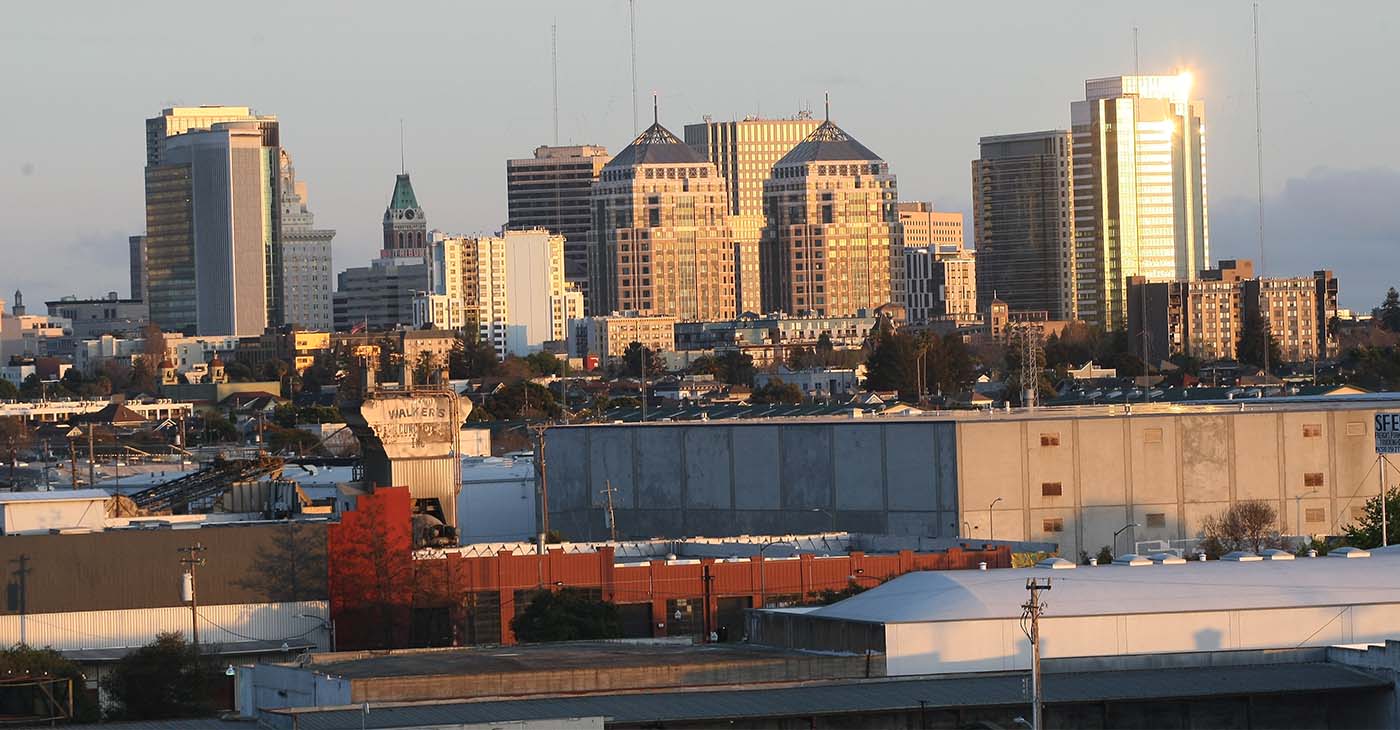
Edward Henderson | Impact Alameda
The California state government has been reminding businesses and landlords across the state that it is illegal to discriminate against job and rental applicants because they have committed felonies or misdemeanors in the past.
The California Department of Fair Employment and Housing (DFEH) is also encouraging the public to report housing ads that use discriminatory language to exclude certain racial groups, immigrants, people with felonies, and applicants with Section 8 or U.S. Department of Housing and Urban Development (HUD) vouchers; etc.
“The California Department of Fair Employment and Housing announced a new effort to identify and correct violations of the Fair Chance Act, a pioneering state law that seeks to reduce barriers to employment for individuals with criminal histories,” a DFEH statement read.
The Fair Chance act, which took effect on January 1, 2018, was written to increase access to employment and housing for Californians with criminal histories — a way to reduce recidivism, among other goals. Employers with five or more employees are prohibited from asking a job candidate about conviction history during the hiring process or when advertising a vacancy.
Since the law passed, the state has sent more than 500 notices to businesses informing them that they have violated protections put in place to protect people seeking work.
The DFEH says it is implementing new technologies to conduct mass searches of online job applications that include unlawful statements. For example, some businesses explicitly state in hiring advertisements that they would not consider applicants with criminal records.
“Using technology to proactively find violations of the state’s anti-discrimination laws is a powerful strategy for our department to protect Californians’ civil rights,” said DFEH Director Kevin Kish. “DFEH is committed to preventing employment discrimination through innovative enforcement actions and by providing clear guidance to employers.”
DFEH released a toolkit to aid employers in adhering to the Fair Chance Act guidelines. The toolkit includes sample forms and guides employers can use to follow required procedures; a suggested statement that employers can add to job advertisements and applications to let applicants know that they will consider individuals with criminal histories; answers to frequently asked questions (FAQs) about the Fair Chance Act and an informational video that explains the Fair Chance Act.
In addition, DFEH plans to release an interactive training and an online app this year.
Before authorities lifted the statewide COVID-19 public health restrictions, DFEH also warned businesses against masking discrimination with COVID safety precautions.
“As Californians navigate the COVID-19 pandemic, the Department of Fair Employment and Housing has provided guidance to protect civil rights and mitigate risk of COVID-19 transmission in employment, housing, healthcare, and, in our guidance released today, businesses open to the public,” said Kish. “We can and must uphold civil rights while simultaneously disrupting the spread of COVID-19.”
DFEH encourages individuals to report job and housing advertisements violating the Fair Chance Act or other instances of discrimination.
Visit the DFEH website to file complaints. (https://ccrs.dfeh.ca.gov/s/login/)
California
COVID Recovery in Alameda County: Our Church Is Offering Free Tests
Variants still pose a threat. And case numbers are still on a gradual decline here in California and around the country. Therefore, we can’t throw all caution to the wind when it comes to keeping our loved ones safe and healthy. The death rate resulting from COVID-19 is still higher for Black Californians than the statewide average, according to numbers from the California Department of Public Health.
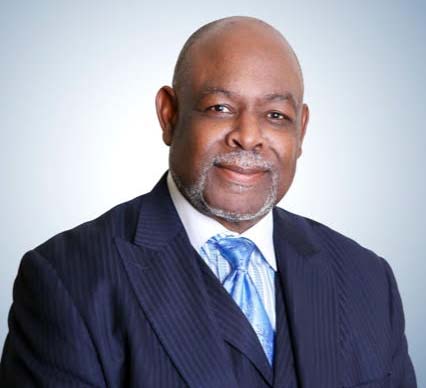
Rev. Gerald L. Agee | Impact Alameda
States and cities have lifted mask mandates and other COVID-related restrictions. But even as we readjust to life as it was before the pandemic, we know that COVID is not fully gone for good.
Variants still pose a threat. And case numbers are still on a gradual decline here in California and around the country. Therefore, we can’t throw all caution to the wind when it comes to keeping our loved ones safe and healthy. The death rate resulting from COVID-19 is still higher for Black Californians than the statewide average, according to numbers from the California Department of Public Health.
At the height of the coronavirus crisis, Black pastors across California recognized the urgency of the COVID-19 threat. As we move from pandemic to endemic, we still do.
We continue to accept the responsibility of this fight, and we understand as faith leaders in our communities that we must combine faith with action. Prayers for healing and health must be backed up by a plan for protection and prevention that keep our communities safe and the virus at bay.
That is why dozens of faith leaders across our state have worked together to keep the doors of our churches open for convenient COVID-19 testing. Some sites offer vaccinations. This effort to keep our congregations and our neighborhoods safe has been made possible with the support of our testing partner Color and the California Department of Public Health.
The pastors in our network, their congregations, staff, and volunteers at our churches and in our community have done an excellent job. Their effort has contributed in no small way to the high COVID-19 vaccination rate and low positivity rate we now have in California. We are truly proud and grateful.
As we walk into this new phase of our COVID-19 response, we must prioritize safety, especially for those among us who are aging or otherwise fragile.
As our slogan tells us, “Don’t guess, get the test” before fully chucking your mask, or going back to work or traveling to see loved ones.
Look up one of our centers in your community to get vaccinated and tested. It is the surest way that we can stem the spread of this virus.
We must decide to renew our hope and lead with faith even stronger than we have been doing. With that resolve, committing ourselves to keeping each other and our communities safe will be easy.
Remember, we can end this endemic once and for all — together.
About the Author
The Rev. Gerald L. Agee is the founder and pastor of Christian Friendship Church in Oakland and the statewide manager for the Black church testing program.
-
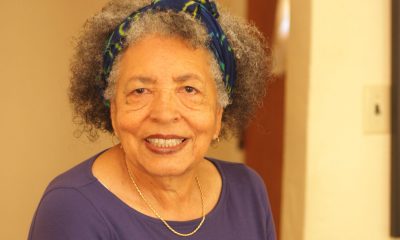
 Business3 years ago
Business3 years agoVolunteer to V.P.: Margot Dashiell Fights for Families Dealing With Mental Illness, Trauma
-
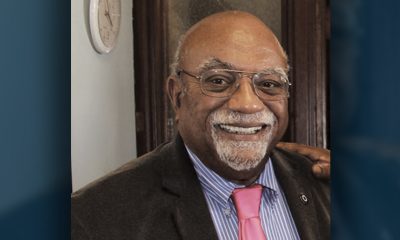
 Highlights3 years ago
Highlights3 years agoJuvenile Justice in Alameda County: We’re on Our Way but More Needs to Be Done for Our Children
-

 Business3 years ago
Business3 years agoWalking by Faith, Leading with Love: Rev. Ken Chambers Invests in Alameda County
-
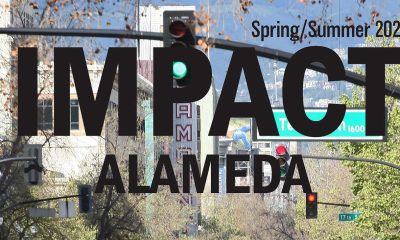
 Resource Guide3 years ago
Resource Guide3 years agoIMPACT MEDIA | SPRING / SUMMER 2022
-

 Highlights3 years ago
Highlights3 years agoA Voice for Victims: Cal NAACP Is Helping to Clear Criminal Records for Free
-
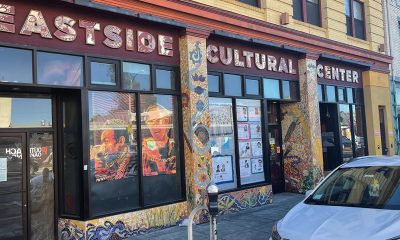
 Entertainment3 years ago
Entertainment3 years agoThe Art of Justice: Oakland’s EastSide Arts Alliance Offers Classes, Bookstore
-

 Business3 years ago
Business3 years agoA Voice for Victims: Cal NAACP Is Clearing Criminal Records for Free
-
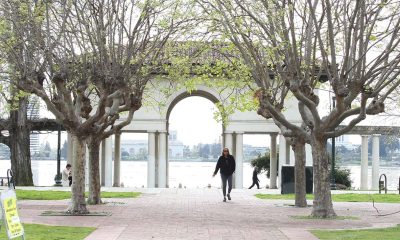
 Education3 years ago
Education3 years agoDismantling Pipelines to Prison: Fresh Lifelines for Youth (FLY) Reimagines Opportunity for Young People




